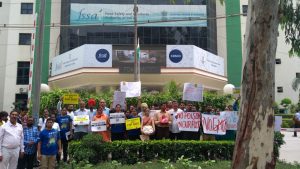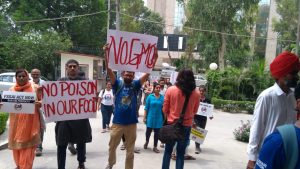“No Poison in Our Foods, Please” – India For Safe Food tells FSSAI
CITIZENS KNOCK ON FSSAI DOORS FOR CONCRETE ACTION AGAINST ILLEGAL GM FOODS IN INDIA
New Delhi, August 7th 2018: Pressing the food safety regulator FSSAI to take concrete action against illegal GM foods flooding into Indian markets, as confirmed recently by Centre for Science & Environment (CSE)’s findings, a delegation of citizens representing India For Safe Food turned up at the FDA Bhawan (FSSAI office) in Delhi. “The response of the FSSAI does not satisfy us. It is not enough that they say that they are in the process of formulating regulations with regard to GM foods. They have said this for years now. What about the interim, when GM is being consumed by unaware citizens unknowingly, and when industry is using loopholes to undertake unlawful sales?”, said Indian For Safe Food (IFSF) in a statement here. IFSF demanded that all GM foods, which are unpermitted and illegal in their presence in our markets, be removed by FSSAI immediately, and that punitive action be initiated against the violators so that it also becomes a deterrent for others.
The delegation met with the CEO of FSSAI with a memorandum and a basket of the illegal GM foods with a message that said, “No Poison in Our Food”. “However, the FSSAI CEO did not commit to anything concrete in terms of acting on illegal unapproved hazardous GM foods. He said that he will not act on a private organisation’s findings. But then, he did not say that FSSAI will take up the testing itself, verify and act either! In fact, we are aghast that he asserted that there are no adverse health impacts from GM foods, ignoring the vast body of scientific evidence that already exists”, said Ajay Etikala, a young Delhi’ite who works to promote awareness about safe food amongst urban consumers. “We will continue to put pressure on FSSAI until they act in the interest of citizens”.
CSE’s lab testing of food products samples from Delhi, Punjab and Gujarat found that one third of the samples tested were positive for GM even though genetically modified (GM) foods are illegal in India. 16 of the 21 foods that tested GM positive (80%) were imported and 5 were manufactured in India. This means that a vast majority of illegal GM foods are making their way into India by way of stealthy imports. 13 of the brands did not mention use of GM ingredients anywhere on their labels, while 3 products were even mislabelled, saying they were GM-free. GM-positive imported food products were based on, or used soy, cotton seed, corn and rapeseed. Positive samples manufactured domestically were made from cottonseed.
Jaya Iyer of KHANA, a consumer awareness group working on food justice issues said, “A consumer’s right to know what s/he is consuming, right to safe food and right to informed choices are all being violated by the inaction of FSSAI. It is very shocking that FSSAI is not putting out an order instructing all such foods to be removed from the shop shelves, distribution centres and storehouses. There are instances in the past when they have indeed acted responsibly and got their enforcement wings to remove unapproved foods. Why will they not do it now?”, she demanded.
“In fact, all foods that are ‘suspected-to-be-GM’ (based on the country of origin being GM-cultivating, and ingredients list containing corn, canola, soy, cottonseed, squash and papaya) should be allowed to be sold only if an undertaking, based on lab testing, is given by the importer that they are GM-Free. In fact, the foreign trade regulatory regime requires this. If this is not done, we will have to assume that the regulators are on the side of the food industry, are willing to jeopardise consumer health and are ready to work against their very core mandate”, said Dharmendra Kumar of Janpahal, another consumer awareness group which also works with street vendors.
Dr Amar Singh Azad, Director of Kheti Virasat Mission’s Environmental Health Action Group, who is a public health expert and also a child health expert said, “Consumers have every reason to worry about such GM foods. The genetic engineering process, the individual genes used as well as the chemicals that are used in conjunction with GM crops are all factors in making these foods hazardous for human consumption. GM foods can potentially result in infertility, immune system disorders, damage to vital organs like liver, kidney, pancreas, lungs, brain etc., allergies, gastro-intestinal problems, adverse effects on the development and growth of an organism, and even cancerous growth, as per various studies available. There is evidence of correlation between consumption of GM crops or consumption of animals fed with GM crops to the incidence of chronic diseases like organ diseases, (thyroid and liver) cancers and neurological diseases from the USA. There is scientific evidence on alterations in the nutritional composition of a GM food. There is absolutely no reason or need for India to be allowing such GM foods to be consumed here. The Government should actively ensure that GM foods do not enter our food chain”.
“FSSAI is expected to maintain the highest standards of safety for consumers. A day after the findings of CSE were made public, thousands of tweets demanded more concrete action from FSSAI. Later, the Coalition for a GM-Free India sent a letter to FSSAI demanding effective action. The FSSAI has not reacted positively so far, we are very disappointed about what we heard from the CEO today, and this does not improve the credibility of the regulatory agency. The Minister for Health & Family Welfare should initiate investigation into the procedural lapses that led to such large scale flooding of GM foods into our market and take action on the regulators who were not discharging their duties”, said Dr Rajinder Chaudhary of Kudrati Kheti Abhiyan.
The delegation of IFSF, while it presented its demands memorandum to the FSSAI, was supported on social media by a Twitter Action from citizens all over India, demanding that FSSAI take up concrete action of removal of GM foods from the market, and penalising of violators.
THE MEMORANDUM SUBMITTED BY IFSF IS DOWNLOADABLE HERE.
_For more information, contact:_
- Ajay Etikala, India For SafeFood – 9971615133
- Dr Rajinder Chaudhary, Kudrati Kheti Abhiyan – 9416182061
- Kavitha Kuruganti, Coalition for a GM-Free India - 8880067772











